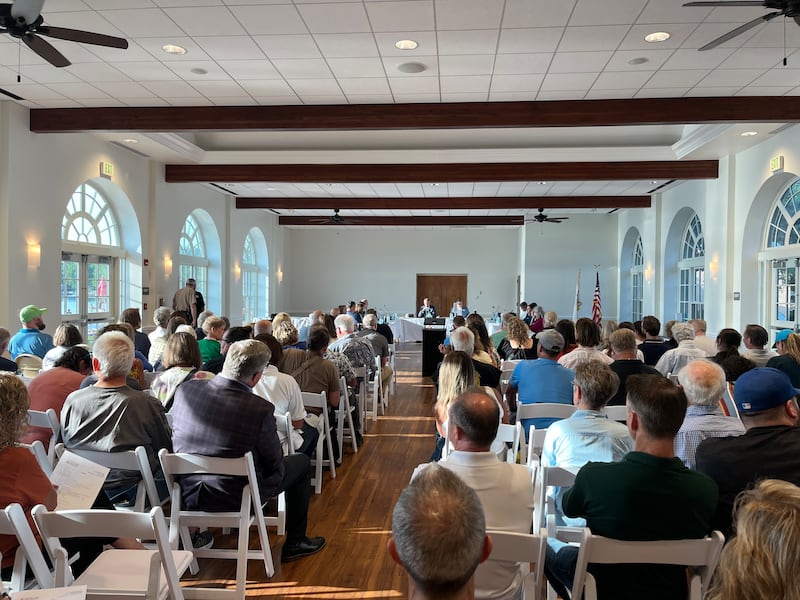The Crystal Lake park board found itself in another hostile meeting Monday evening – one that lasted nearly five hours and included yelling, personal jabs and booing from the public, with over 100 people in attendance.
Board President Frederick Tiesenga started the meeting by highlighting the fact that the Illinois Attorney General’s Office dismissed resident concerns that Open Meetings Act violations had occurred. Five people had filed complaints with the state over the board taking votes on agenda items that weren’t marked as action items and making decisions during Committee of the Whole meetings, which typically involve discussions only.
“Their effort has fully vindicated this board and dispelled the cloud of suspicion spread by inaccurate press reports,” Tiesenga said.
The Open Meetings Act does not have a provision governing the type of action that may be taken during Committee of the Whole meetings, nor does it require the board to receive certain information before taking final action on an item, Assistant Attorney General Christina Lucente-McCullough said in a letter.
:quality(70)/cloudfront-us-east-1.images.arcpublishing.com/shawmedia/Z323HVQLCJAEJMZIG6DAA57S2U.jpg)
Resident Carolyn Schofield, who also serves as vice chair of the Chicago Metropolitan Agency for Planning board, responded: “While this is legal, it is questionably ethical and definitely not fully transparent.”
Another letter from Benjamin Silver, supervising attorney of the Public Access Bureau in the attorney general’s office, said: “The Office of the Public Access Counselor, however, is also charged with providing advice and education to both the public and public officials. In that capacity, this office notes that the board could better inform the public by providing clear indication on its agendas of its expected course of action with each agenda item, including whether an item it is planning to discuss may be up for final action at the meeting.”
Monday’s meeting included over an hour of public comments, many of which raised some of the same concerns brought up at previous board meetings such as lack of transparency, the board’s decision to cancel the district’s Diversity, Equity and Inclusion policy and the perception that the board is not listening to the public.
As of Tuesday, over 1,000 people had signed an online petition calling for the board to “stop acting in their own interest and re-center serving the public in every decision they make.”
Tiesenga defended recent board actions that have received backlash from some members of the public. He pointed out that the city of Crystal Lake does not have DEI policy of its own.
“Some of our most vocal DEI advocates have attended meetings, only to hurl racial labels at commissioners, calling us ‘white men,’” he said. “Such language contradicts the very principles of respect and inclusion.”
Many residents spoke in favor of the park district staff and Executive Director Jason Herbster, who has served in the position for 15 years.
“Thank you, Jason Herbster, for all you’ve done for all these years. Thank you staff for all you’ve done,” Crystal Lake Mayor Haig Haleblian said. “I’m going to tell you guys, some of this staff, some of the people that work here, are walking on eggshells. They’re frightened for their jobs.”
Other elected officeholders came to speak out against recent board decisions, though they noted only as private residents. That included McHenry County Board member John Collins and Crystal Lake City Council member Ian Philpot.
Commissioner Cathy Cagle raised concerns over a pending president’s message that is slated to run in the fall program guide. In the letter, Tiesenga questions whether increased property taxes and increased spending on staff wages is worth it to the taxpaying resident.
“We need to evaluate if you would like to see this trend continue,” Tiesenga wrote in the letter. “Do you participate in our programs? Or are you just paying the bills for others to do so?”
Collins pushed back against Tiesenga’s message, saying that shared resources raise property values, support public health, reduce crime and build community.
“Paying for wages for quality service isn’t wasteful – it’s responsible,” Collins said. “You’ll be warned that taxes are a condition of keeping your house. That kind of rhetoric is misleading, divisive and frankly, inappropriate.”
Cagle motioned to put the letter on hold from publication, but it failed in a 3-3 vote.
One thing the board did unanimously agree on was abandoning the idea to install a debris screen, called a weir, on Crystal Lake’s namesake lake. Tiesenga told the Northwest Herald Tuesday that he originally pursued the idea as a tool to raise the lake levels in order to hinder high bacteria levels and make boating easier.
The weir, which would cost $30,000, would not raise water levels, and the city could remove it within five to 10 years for culvert reconstruction, Herbster said.
At times, commissioners became heated with each other. Cagle raised her voice at park board attorney Eric Anderson for not speaking into the microphone for everyone to hear. Anderson is a former park board president who took over as the district’s new attorney the same day his parks commissioner seat expired, with a rate almost 60% higher than the pervious attorney.
“You counsel the whole board here. You do not counsel Fred [Tiesenga],” Cagle said. “No, you do not have client privileges.”
The board also approved a plan, in a 3-2 vote, to hold only one meeting each month and drop the Committee of the Whole meetings. Commissioner Richard Hickey abstained.
Since the new board members took office in May, many of the board’s actions have been made in 4-3 votes, with the majority being newcomers Tiesenga, Keith Nisenson and Hickey, along with Jason Heisler.
